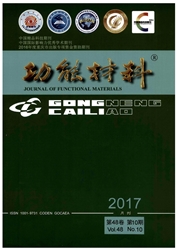

 中文摘要:
中文摘要:
以甘油、二乙醇胺和山梨醇为复配增塑剂,首先对PVA进行预塑化处理,再通过密炼机对预塑化后的PVA进行塑化加工,然后采用平板硫化机热压成膜法,将其制备为改性PVA薄膜。系统研究了改性PVA的塑化加工工艺,得出了最佳的塑化加工工艺条件,并采用差示量热扫描仪(DSC)、扫描电子显微镜(SEM)和万能拉力机对改性PVA薄膜的热熔融行为、微观形貌和力学性能进行了表征。结果表明:甘油,二乙醇胺/山梨醇复配质量比为1:1:1时,塑化剂分子形成了良好的协同增塑效应,显著地降低了PVA的热熔融温度;改性PVA的最佳预塑化条件为50℃的预塑化温度下,预塑化12h;最佳密炼工艺条件为180℃的混炼温度、30r/min的转速下,混炼20min。在此最佳塑化加工工艺条件下,当复配剂添加质量分数为25%(各复配增塑剂的复配质量比为1:1:1)时,改性PVA的熔点为161.6oC,相对于纯PVA下降了33.4℃。
 英文摘要:
英文摘要:
PVA was precured with glycerin/diethanolamine/sorbitol as compounded plasticizer and plasticized on mixer, and then the PVA composites film was prepared on vulcanizer. The melting behavior, surface morphology and mechanical properties of the PVA composites were characterized with DSC, SEM and tensile testing machine. The results showed that there was a great collaborative plasticizing effect when glycerol, diethanolamine and sorbitol were mixed at molar ratio of 1:1:1 as compounded plasticizer, which significantly reduced the melting temperature of PVA. The optimum processing parameters were as follows: precuring at 50℃ for 12 h; and mixing with 30 r/min at 180 % for 20 min. The melting point of PVA composites was at 161.6 ℃ when loaded with 25 wt% compounded plasticizer, dropping 33.4 ℃compared to melting point of the pure PVA.
 同期刊论文项目
同期刊论文项目
 同项目期刊论文
同项目期刊论文
 期刊信息
期刊信息
